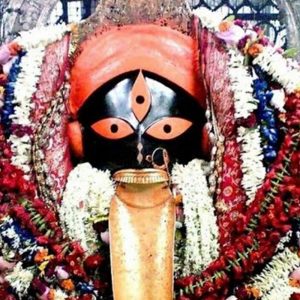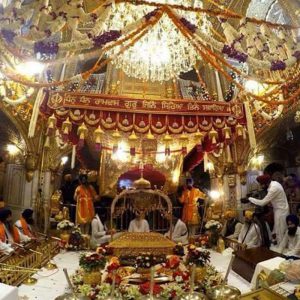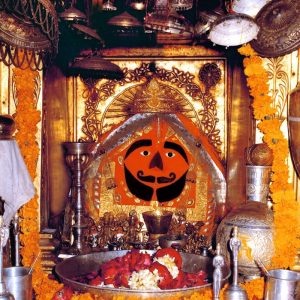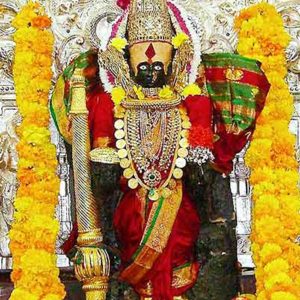-
Pujas at Kali temple, Kalighat
Kalighat Kali temple is one of the 51 Shakti peethas in India which is devoted to the Hindu Goddess Kali and is situated on the banks of Adi Ganga, which used to be the first course of Hooghly. As per the legend, this was one of the 51 places where parts of Sati’s body fell after the Rudra Tandava of Shiva. Kalighat was where the toes of Sati fell and was found by a devotee in the bed of Bhagirathi River and he began worshipping it. The temple exists in its present shape just for barely 200 years, however, one can discover proof of its reality in the sacred writings and other content going back to the Gupta period.
Benefits:
- For protection against all negativities and miseries.
- For health, peace, and longevity of life.
- For power, prosperity, and success.
- For divine blessings and grace of Maa Kali.
₹100011Pujas at Kali temple, Kalighat
₹100011 -
Poojas at Kamakhya temple, Guwahati
Kamakhya is one of the 51 shakti peetha and most popular in India. Kamakhya Devi is more powerful as the yoni of mata Sati had fallen there and is being worshipped in Kamakhya temple. The most important part of the temple is situated in a cave almost 20 feet below from the ground. There is no image in the cave; a yoni shaped cleft is worshipped there with flowers, saree, chunri, sindur and prasad. A sanctum natural spring that flows through the Yoni is considered very powerful and is believed blesses with final emancipation that is Mokshya. Tantriks are come here to achieve their desired success as Kamakhya Devi is the goddess of tantras. And a tantrik feels incomplete without visiting this temple once in life. The puja is mainly the fusion of faith and practices. The Devi is worshipped in Vamachara and Dakshinachara modes. Female animals are not sacrificed in this puja. There are three pujas in kamakhya temple:- Ambubachi festival
Kamakhya devi puja
Ameti or tantric fertility festival
Benefits
- Harmonises the five sheaths
- Transforms a human into divine being
₹51000 -
Guru Granth Sahib Puja and Lunger
The verses of Guru Granth Sahib are noted as very auspicious and unique. It is marked as great scriptures and the supreme authority among the Sikhs. In Sikh religion, the verses of Guru Granth Sahib are considered above any particular individual or God. Guru Granth Sahib is in it is a collection of verse in praise of God and is the way to be followed for better human existence. The practice of Guru Granth Sahib Puja and Lunger are all about the spreading of ethical and moral humanitarian ideologies. Lunger in particular is about having free meal in the house of God, without any kind of discrimination. The idea is to promote humbleness and dedicated services to creations of God, and thereby satisfy God for gaining inner peace. It is through Guru Granth Sahib Puja and Lunger, the Sikh community looks forward to gain spiritual calmness and meditation. Buring Akhand Ghee diya symbolises the power of Almighty and it is the way of beliving in that supreme power that has created the whole world.
Guru Granth Sahib Puja service includes
Number of priests: 6
Duration: 3 daysSwastivachan, Sankalp, Ganesh Pujan, Kalash Sthapana, Punyiyahvachan, Abhishek, Shodask matrika Kuldevi Pujan, nandi shraddh Pitr Samarn, 64 Yogini Pujan, Vastu Pujan, Sarvatobhandr mandal Pujan, ShetraPal Pujan, Navgraha Mandal Pujan, 108 chants of Ganesh and nine Planets, Guru Granth Sahib Puja or Yantra Pujan and Abhishekam, Navarn Mantra Jaap, Aarti, Pushpanjali, Bhramin Bhojan
₹25000 -
Pujas at Salasar Balaji temple
Salasar Balaji, another name of Lord Hanuman, is a marvelous place for enthusiasts of Lord Hanuman. It is situated in the town of Salasar, Rajasthan. It is thought to be Shakti Sthal (a place of energy) and Swayambhu (self-made) by confidence, supernatural occurrences and wish satisfaction of the devotees. The standard divinity of the temple is Lord Hanuman, who gets worship of a great many enthusiasts.
₹22390 -






